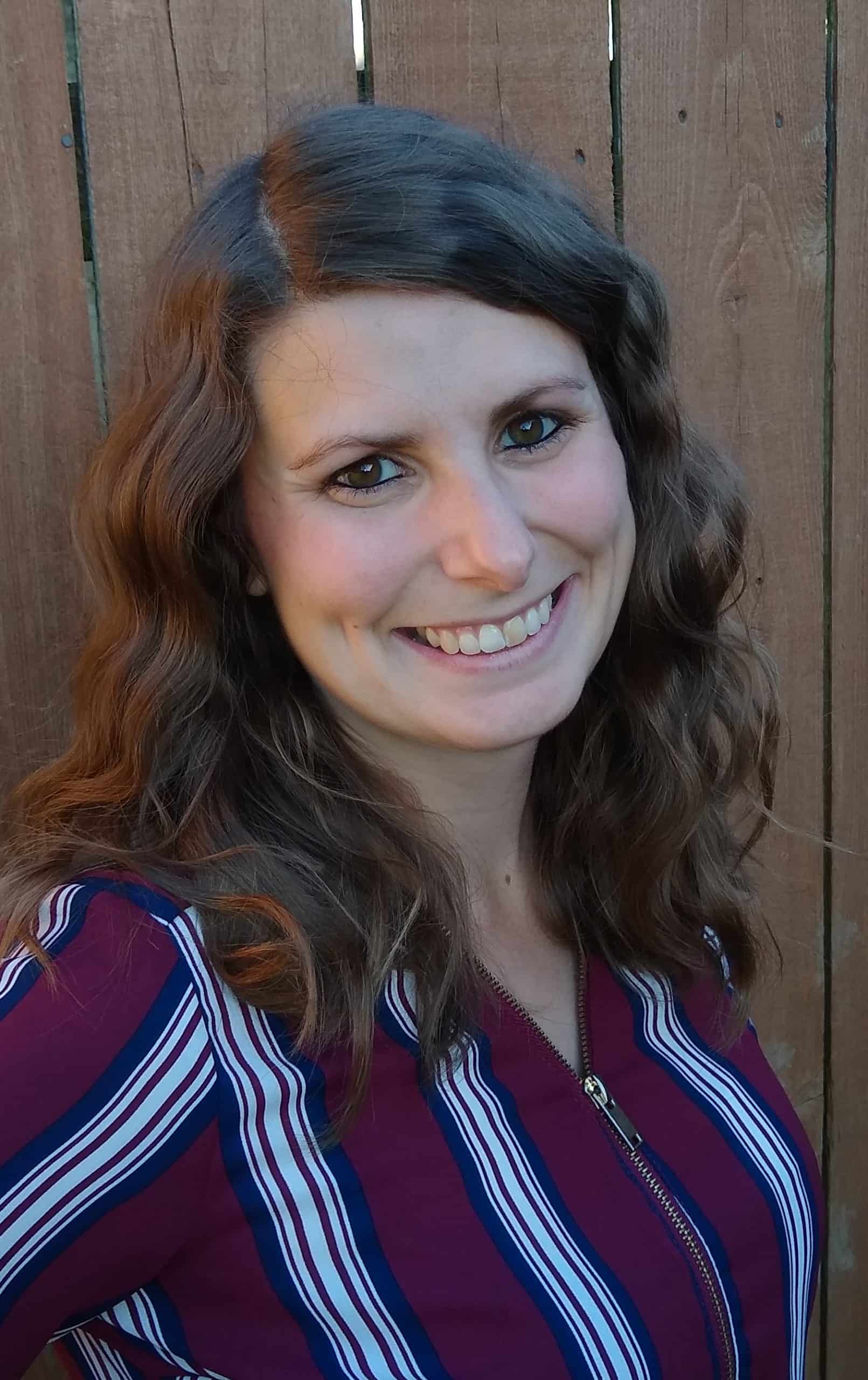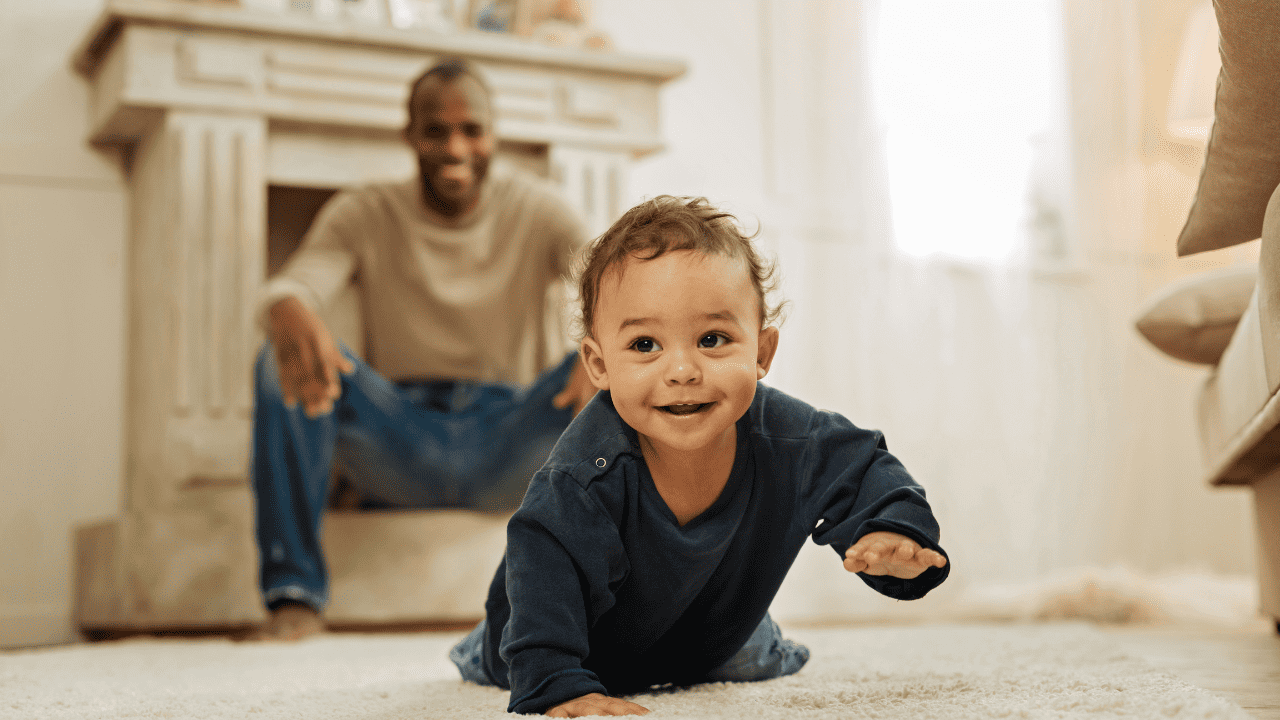 | | | | About the Author Rachel Cook has been a Product Development Specialist at Great Kids® since 2017. Her passion for helping strengthen families is prevalent in her curriculum content creation. Before joining Great Kids, she worked as a home visitor with Kentucky HANDS. She lives in Berea, Kentucky, with her husband and new baby, where she loves writing and exploring nature. Contact Rachel at rcook@greatkidsinc.net. |
When it comes to parenting a one-year-old, I’ve learned speed is a necessity. Recently, my child and I played at the base of the hills we hike. My kiddo crawled around in a beautiful open space painted with warm colors bursting from the trees. Crunchy leaves and jagged pine cones decorated the ground as blue skies peeked through the rolling hills. We joined each other in examining dusty dirt, mossy bark, and ragged rocks. Then, my curious child picked up a smooth acorn and quickly popped the tree nut right into their mouth as if it was a delightful snack they’d been waiting for all day. As I gasped with fear, I realized my hands could indeed move at lightning speed, and I swiped the acorn from their cheeks, caught my breath, and met the beaming dimples shining from my child’s face.
Through experience, I’ve learned that nature is impossible to childproof. I’m finding that it’s always best to be ready for a surprise when it comes to my energetic kiddo. But, it turns out, I’m not the only parent that feels this way. Experts tell us that it’s typical for parents to be unaware of the VARIOUS skills their children have mastered, and it makes sense.1 In the early years of life, kids learn LOTS of concepts and skills.6
Infants are born waiting for experiences and loving adults to support the shaping of their brains.
Many of the experiences that babies have are brand new, making early childhood a period of rapid learning and brain development.5,6,7,11 This intense time of brain building corresponds to why infants are born naturally curious.7,9,11 Children LOVE to play and explore because they’re driven to figure out how this great big world works, and the best way for them to do this is through movement and hands-on experiences (or, for infants, mouth-on experiences).2,3,9,10
As you can imagine, since children are so driven to explore and learn, safety isn’t their top priority. Child development experts support the NEED for kids to be able to take appropriate risks in their playful explorations, and they feel it’s essential for adults to keep them safe.2
Pediatricians recommend that the best way to promote safety is by supervising children at all times. 4 Doing so ALSO supports learning, as experts share that loving and supportive interactions with adults are vital to children’s development in various areas. 6,8
Playful moments with kids can ALSO be an excellent opportunity for you to unlock some of your hidden skills. For instance, it wasn’t until I became a parent that I learned I have lightning-speed reflexes, which explains why experts recommend that in addition to childproofing, adult supervision is critical to creating safe spaces for children.2,4 During moments of supervision, you might still find yourself retrieving acorns from curious hands or trying out your leaping abilities when they demonstrate their new climbing skills, but you’ll be there for them. You’ll be present and able to offer safety and nurturing support, which is exactly what kids need to feel loved and ready to learn.6,8
References
1. American Academy of Pediatrics. (2018, August 30). Safety for your child: 6 to 12 months. Healthychildren.org. https://www.healthychildren.org/English/ages-stages/baby/Pages/Safety-for-Your-Child-6-to-12-Months.aspx#:~:text=NEVER%20leave%20small%20objects%20or,your%20child%20starts%20to%20choke
2. American Academy of Pediatrics. (2021, February 26). Childproofing your home for poisons. Healthychildren.org. https://www.healthychildren.org/English/safety-prevention/at-home/Pages/Childproofing-Your-Home.aspx#:~:text=%E2%80%8BMost%20%E2%80%8Bpoisonings%20occur,door%E2%80%94on%20child%20accessible%20cabinets.
3. Berke, J. (2016, November 22). Let the playing commence! A tribute to Bev Bos. Community playthings. https://www.communityplaythings.com/resources/articles/2016/bev-bos-on-play
4. Canadian Paediatric Society. (2020, May). Keep your young child safe around the house. Caring for Kids. https://caringforkids.cps.ca/handouts/safety-and-injury-prevention/keep_your_young_child_safe
5. Center on the Developing Child at Harvard University. (n.d.). Brain architecture. https://developingchild.harvard.edu/science/key-concepts/brain-architecture/
6. Head Start Early Childhood Learning & Knowledge Center. (n.d.). Interactive Head Start early learning outcomes framework: Ages birth to five. U.S. Department of Health & Human Services & Administration for Children & Families. https://eclkc.ohs.acf.hhs.gov/interactive-head-start-early-learning-outcomes-framework-ages-birth-five
7. Perry, B. D., & Winfrey, O. (2021). What happened to you? Conversations on trauma resilience and healing. Flatiron Books.
8. Roggman, L. A., Boyce, L. K., & Innocenti, M. S. (2008). Developmental parenting: A guide for early childhood practitioners. Paul H. Brookes Publishing Co.
9. Zero To Three. (2010, February 20). Tips on nurturing your child’s curiosity. https://www.zerotothree.org/resource/tips-on-nurturing-your-childs-curiosity/
10. Zero To Three. (2013). Play [Video]. Zero To Three. https://zero-to-three-review.herokuapp.com/early-learning/play#:~:text=When%20your%20children%20play%20with,supportive%20relationships%20all%20their%20lives.
11. Zero To Three. (2016, February 16). Brain wonders: Nurturing healthy brain development from birth [Video]. Zero To Three. https://www.zerotothree.org/resource/brain-wonders-nurturing-healthy-brain-development-from-birth/


